I’m more than 18 months late to the party, and if you’re further behind than that, it’s your problem.
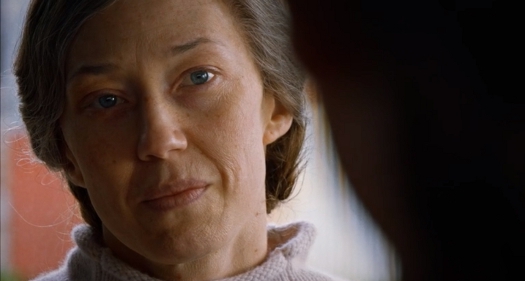
Reading the Finale of The Leftovers
The question of what actually happened with Nora hangs over the finale of The Leftovers, but it is finally unknowable in any conclusive sense. In 28 episodes over three seasons, the HBO show presented many strange events. Sometimes, it showed what happened; just as often, it willfully let the mystery be.
This was a given. Damon Lindelof (the showrunner, co-creator, and frequent episode co-writer) was blunt in interviews that the precipitating event of the series – the Sudden Departure of a seemingly random 2 percent of the world’s population – would never be explained. The second-season theme song told viewers, again and again, that the best approach might be to let go of a need for answers.
Then the finale teases the possibility that we’ll follow Nora to wherever this magical mystery machine will take her. We suspect that she’ll chicken out, and – as the tank fills – we wait for that moment; the machine has a microphone, after all. There’s intense suspense here, not just about what’s going to happen but whether The Leftovers will really do what it’s threatening to. We remember seeing older Nora in the season premiere, denying that the name Kevin meant anything to her. How does that fit with this?
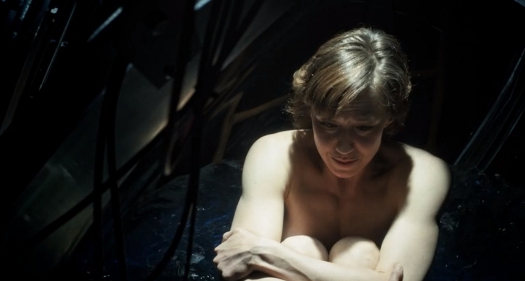
And at the last possible moment, Nora begins to shout something that starts with the letter S, and the show cuts to a time we eventually learn is many years later, with her hiding out in Australia and Kevin finding her. It never shows whether Nora “went through” in an attempt to rejoin her Departed children, or if she aborted her mission. Instead, she finally tells Kevin a story.
Let’s pause for a moment to consider that Nora’s story might be true. Put simply, The Leftovers has had enough unexplained phenomena – most notably Kevin’s multiple resurrections – that there’s certainly room for one more set of strange things to have happened. As likely as it is that the scientists’ machine sends a person’s body into oblivion, we can allow that maybe it works as advertised – that it sends people to the place where the Departed went, and further that it’s possible to return from that place using the same mechanism.
The only reason to reject this possibility out-of-hand doesn’t come from the show; it’s Lindelof’s repeated insistence that he would not tell us the nature of the Sudden Departure. If you choose to believe that Nora’s story is literally true, it represents a major betrayal of the trust between the primary author and its audience. Hey, it wouldn’t be the first time … .
Yet as much as the finale’s approach invites speculation, questions, and theories, it also tells us how to process it. If Lindelof ain’t telling or showing us what actually happened, we must infer that it’s not really important.
But it’s absolutely relevant whether Nora is telling the truth, which is an admittedly odd thing to say on the heels of the preceding sentence. The writers – Lindelof, Tom Spezialy, and Tom Perrotta – are suggesting that this interaction between Nora and Kevin is more important than the objective reality of what happened, but we have literally no evidence supporting or undercutting her tale, so how are we to evaluate it, and what are we to make of it?
The episode also gives us this answer, subtly but unmistakably. While the true reality remains opaque, and while the coyness allows viewers to come to their own conclusions, the reading most strongly rooted in the episode’s text is that Nora is not telling the truth.
The genius of “The Book of Nora” is that it lays this out for us with immense clarity and then welcomes us to set it aside. This story, fantastic in several senses, is likely a big ball of lies. But it’s also emotionally credible, and it’s a reflection of truths essential to both Nora and Kevin: that she has accepted the Departure, that she no longer aches for her lost children, that she is living in the here and now, and that she wants to be with him if he believes her. In that context, Kevin is the open-hearted audience surrogate, and his only hesitation comes from being dumbstruck by her doubt: “Why wouldn’t I believe you?”
Lots of reasons, actually.
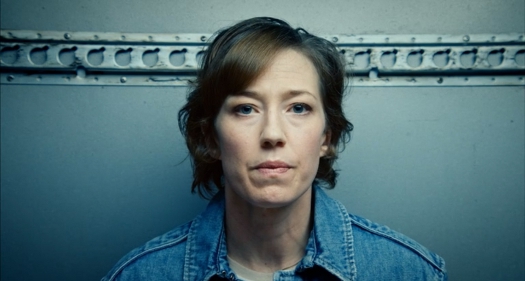
The finale opens with Nora’s video testimonial – a requirement to “go through.” She gives her name and date of birth, shows a copy of that day’s newspaper, indemnifies others for whatever will happen to her, and pledges the she is of sound mind and body and is acting of her own free will.
There’s some discussion between the two scientists in a foreign language.
“She wants you to do it again,” one of them says.
“Why do you want me to do it again?” Nora asks.
“Because I do not believe you.” the other scientist says.
“Excuse me?” says Nora.
“Excuse me, but you are lying. … You’re just saying what we want to hear. … ”
Nora is incredulous and details all she’s been through, including tracking down the scientists after they initially rejected her. “And I don’t lie,” she closes.
The strangeness of the exchange isn’t immediately apparent, but it’s there. Nora has delivered the boilerplate language required of her, and in that there’s little room for falsehood. She obviously wants to go through and has not been coerced, and beyond that the only possible lie is that she’s of sound mind and body – which the scientists are in no position to judge and have no reason to doubt.
So it’s not what Nora says that’s the problem. The lie is in how she says it; she is cool and curt, and makes no effort to sell this as something she needs. She is insufficiently emotional; her demeanor does not match the magnitude of the journey she is about to take.
A key to “The Book of Nora” is that telling the truth has two primary requirements, and neither of them is that the words being spoken are actually true. First, one has to say them persuasively. And then the recipient has to believe them. A third criterion is admittedly less important, but it shouldn’t be discarded in the context of the finale: The presented truth can’t contradict obvious available evidence.
The precedent for this framework in the central relationship of The Leftovers was established in the second season, when Kevin presents Nora with a question: “I need to know that you’d believe me if I looked you in the eye and I told you that she was gone, that you’d know that she was. … Would you believe me?”
The phrasing is essential: It’s not about Patti Levin; it’s about Kevin and about Nora. He’s asking if she has faith in him, and if she trusts him, and she says, “I would believe you.”
This set of rules – the earnestness of the telling matched by receptiveness – is tested throughout “The Book of Nora,” and in nearly all cases up to the final conversation one of the requirements is not met.
There are lots of fibs that nobody much cares about. The nun lied to Kevin, but she
suspects he didn’t believe it. Nora and the nun lie to each other, and none of the untruths is believed. The nun tells the wedding guests that the birds will send messages of love around the world, and – based on some of the jokey messages they’ve written – they don’t put any stock into it. “It’s just a nicer story,” she says.
But there are lies in “The Book of Nora” with higher stakes: when Nora’s correct words to the scientists won’t cut it absent emotional investment, and when Kevin’s “nicer story” isn’t good enough.
When he tries to pretend that he and Nora have little history, he’s initially adept enough with the lie that we wonder whether we’re in some parallel universe that wiped out two and half seasons of television.
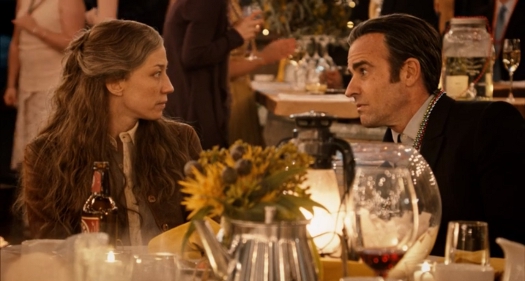
Kevin will later claim he was improvising: “I didn’t know what to say, or where to start. And so I just thought, ‘Aw, fuck it. I’ll erase it. Just erase it all, and maybe that would give us another chance.’” The lie isn’t really a lie if it’s nakedly a symbol and a promise, that this could be a fresh start for them.
There are two problems, however, and the result is that Nora, the recipient of the lie, can’t abide by it.
The first issue is that even if, somehow, Kevin’s yarn were actually true – that he doesn’t remember or that this version of him didn’t live it – her experience with him makes it difficult for her to buy into his story. It certainly doesn’t help that Kevin has adopted the mannerisms of a depleted man – the way he speaks, the way he holds himself – that make him seem like a completely different person.
Even so, her ambivalence at the wedding is clear, with her fear and skepticism at war with her yearning to reconnect with Kevin, suggested by her willingness to play his game.
But then there’s the second problem: Nora has evidence – the nun telling her that Kevin showed her a photo and asked after her – that her former lover’s story about seeing her on a bike is untrue. She gives him opportunity after opportunity to come clean, and each time he digs himself into a deeper hole, with his words becoming ever less convincing. And she leaves.
So when Kevin returns to Nora’s house the next morning, he confesses his ruse and tells her a different tale – one whose perceived veracity (not coincidentally) hinges on both his and Laurie’s sincerity. He looks and sounds like the old Kevin, and Nora believes him, and she invites him in for tea.
And then she tells Kevin the story. It’s incredible and suspiciously tidy, but it’s also heartbreaking and resonant, and Nora and Carrie Coon play its internal conflict so fully that you, in the audience, desperately want to believe it.
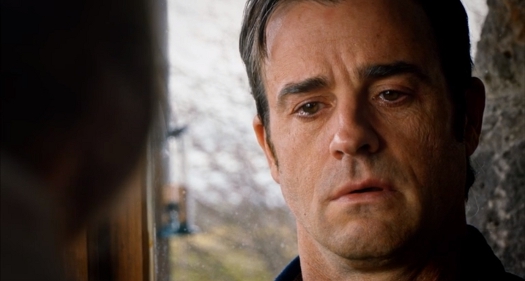
It gives us everything we want: The Departed are living in a world where 98 percent of the population vanished; her children are happy with their father and new mother; Nora realized she didn’t belong with them any longer; and she came back, with some part of her wanting Kevin to find her.
Is it true? The episode instructs us to be dubious, and Nora practically begs for it. “But so much time had passed. It was too late. And I knew that if I told you what happened … you would never believe me.”
Yet even if every element of the story is fabricated, it’s not merely a “nicer story,” one that both Kevin and Nora would love to believe. There’s truth in it – a state of being that the characters of The Leftovers have sought from their first moments in the show: peace with the Sudden Departure, and the possibility of a real life beyond it. If Nora Durst never visited the place her children went, she nonetheless has returned fully to this place, and Kevin can see that.
If Matt’s “Book of Kevin” took a reality – or at least Kevin’s experience of reality – and twisted it into a messianic lie, Nora’s story – on the assumption that it has no factual basis – does exactly the opposite. She’s honed this fiction, massaging the narrative to reveal something essential.
And part of that is the escape hatch she gives Kevin. She knows he would never call “bullshit” on her, but she’s watching him carefully. Will he engage his cop brain? Will he even consider for the slightest moment that she’s not being honest? Her lie requires not just a willing recipient, but a recipient with full, instant, and unwavering faith in her.
The assumption is negative: “You would never believe me.”
“I believe you,” he says.
“You do?”
“Why wouldn’t I believe you?” he says. “You’re here.”
“I’m here.”
Each of the lines with which Nora ended The Leftovers’ two previous seasons were perfect encapsulations of tentative hope: “Look what I found” and “You’re home.” Both played as much like questions as statements.
But there’s no doubt in this one, once the story has been told, heard, and accepted: “I’m here.”
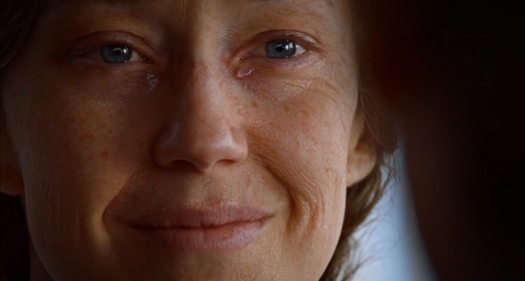


Nora Durst was definitely lying, because if her story was the truth, others would have used the machine to come back.
I disliked Nora from the beginning. I felt Laurie got the shaft from the beginning.